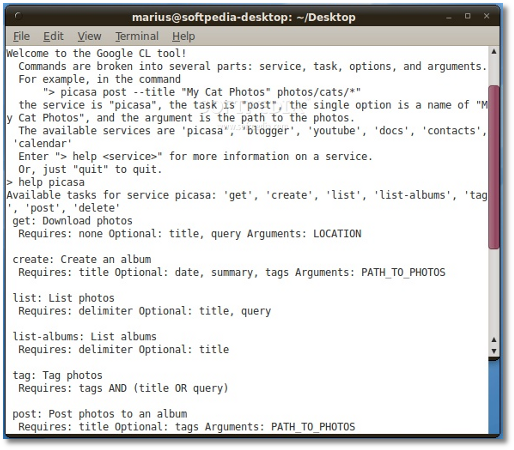This weekend, Google proudly announced GoogleCL, a set of new command-line tools for some of its popular services, such as Google Calendar, Google Docs, Blogger, YouTube and Picasa. GoogleCL will allow you to upload photos to Picasa and videos to YouTube, add Google Calendar events or contacts on Google Contacts, edit Google Docs documents or post on your Blogger blog... all straight from the Linux terminal. Well, you will say now... "Who needs this stuff? We are in mid 2010 and command-line is for geeks only." You are right! But this is a very good opportunity for some developers to create a nice graphical user interface (GUI) for this command-line tool.
"Ever wanted to upload a folder full of photos to Picasa from a command prompt? We did, a lot, last summer. It made us want to say: google picasa create --title "My album" ~/Photos/vacation/*.jpg So we wrote a program to do that, and a whole lot more. [...] GoogleCL is a pure Python application that uses the Python gdata libraries to make Google Data API calls from the command line. [...] GoogleCL brings cloud computing to your fingertips, literally!" - was stated in the official announcement.
Below are a few examples of each command-line tool in action:
Blogger
google blogger post --title "foo" "command line posting"
Contacts
google contacts list name,email > contacts.csv
Google Calendar
google calendar add "Lunch with Jim at noon tomorrow"
Google Docs
google docs edit --title "Shopping list"
YouTube
google youtube post --category Education killer_robots.avi
Picasa
google picasa create --title "Cat Photos" ~/photos/cats/*.jpg
For more examples, please check the official home page.
You can download and play with the new GoogleCL command-line tool right now from Softpedia. It's available and tested by the Softpedia Linux team on the Ubuntu 10.04 LTS (Lucid Lynx) operating system. GoogleCL will also be included in the Ubuntu/Debian software repositories, just in time for the next releases of these operating systems.

 14 DAY TRIAL //
14 DAY TRIAL // 